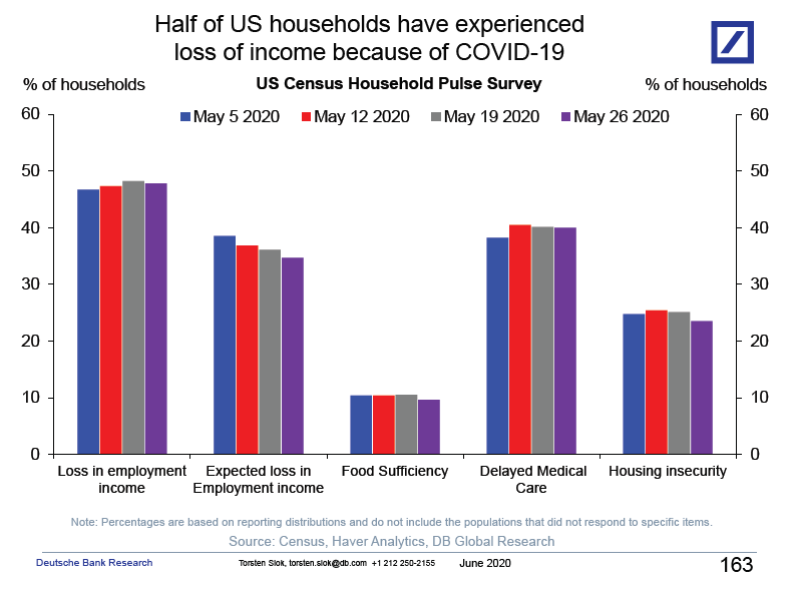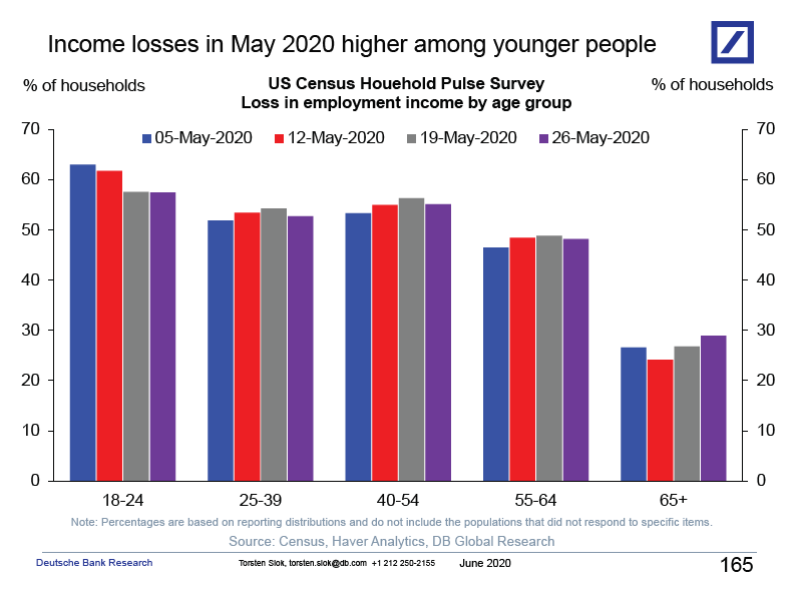Coronavirus caused income loss for nearly half of American households
Laura F., 27, was laid off in April.
She had been working as a concierge services coordinator at a nonprofit performing arts organization in New York City for four years before the closure of entertainment venues across the city destroyed demand for her skills.
“Job hunting is already incredibly tough without a global pandemic,” she told Yahoo Money.
Read more: How to find a job in a tough economy
The coronavirus pandemic and response have left millions of Americans like Laura without a job and caused employment income loss for nearly half of the households across the country, according to research from the Household Pulse Survey by the U.S. Census Bureau.

‘Highlights how important the fiscal rescue packages have been’
Data collected at several points in May revealed that around 48% of households said they had experienced a loss of employment income since March 13, according to an analysis by Deutsche Bank Chief Economist Torsten Sløk.

The data also revealed that 60% of Hispanic and Latino households experienced an income loss, followed by 55% of Black households and 50% of households which categorized themselves as two or more races.
Low-income households were feeling the most pain from the income losses: 56% of households making less than $25,000 had seen a hit to their income, and 57% of households earning between $25,000 to $34,999 experienced the same. At the other end of the spectrum, only 32% of households earning $200,000 and above saw a hit to their income by COVID-19.

Sløk noted that even though these households have lost employment income, unemployment benefits replaced part or all of their overall income in many cases.
“So the important point in these charts is that they show how many households have been impacted by the virus either by losing the jobs or having their salary lowered,” Sløk told Yahoo Money.
Consequently, the data “highlights how important the fiscal rescue packages have been in supporting household finances and spending,” Mark Zandi at Moody’s Analytics told Yahoo Money. “So far, the loss of wage income has been offset by the increase in unemployment insurance, the stimulus checks, and increases in other income support.”
So “unless there is another fiscal rescue package, these households will have no choice but to stop paying bills and slash their spending,” Zandi added. “The economy, which is only now beginning to recovery, will be pushed back deep into recession again.”
States hit hardest
It’s worth noting that the employment situation has looked vastly different across the U.S.

The hardest hit states included Nevada, with nearly 63% of households seeing their incomes damaged, followed by Michigan, California, and Hawaii all around 56% and New York at 54.5%.
Furthermore, young people felt an even higher level of financial pain in the fallout of the pandemic-induced recession.

And so no wonder Laura F., a 27-year-old pursuing a career in the New York City performing arts industry, wasn’t very optimistic about her job prospects in the short term.
“Ultimately, my position — fueled by ticketing various performances — was no longer feasible to the organization, as it is questionable when the city and the world will be able to welcome back patrons of the arts to their theaters,” she said. “Job listings have and will continue to be scarce until I believe at least next year.”
—
Aarthi Swaminathan is a reporter for Yahoo Finance.
Read more:
The American teacher crisis is getting rapidly worse amid coronavirus pandemic
'It’s a freaking circus': Unemployed Americans share tales of an overloaded system
'Struggling so severely': Coronavirus exposes the gulf between the haves and have-nots
Read the latest financial and business news from Yahoo Finance
Follow Yahoo Finance on Twitter, Facebook, Instagram, Flipboard, SmartNews, LinkedIn,YouTube, and reddit.

 money
money 
